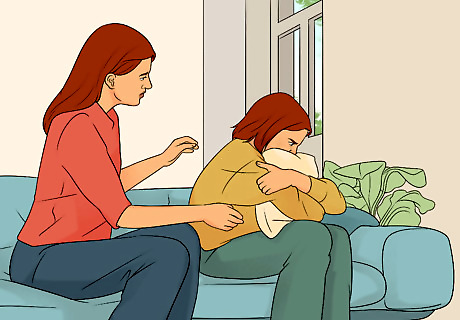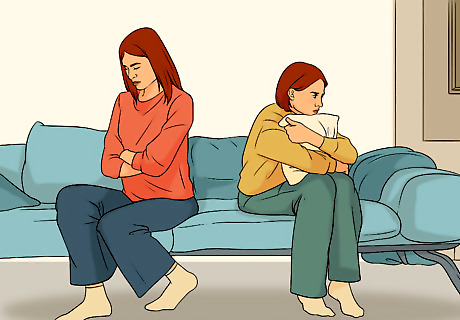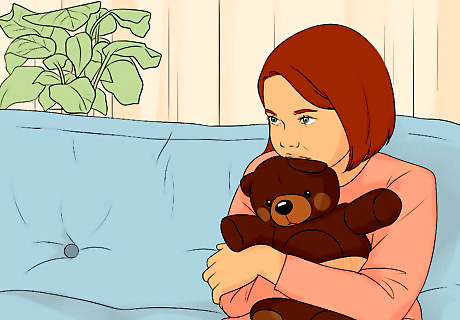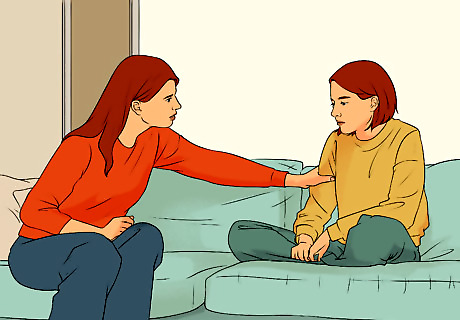
views
- Your child’s emotional distance may be caused by changing family dynamics, a need for more freedom, or negative experiences in their childhood.
- Reach out to your child with a phone call or letter. Explain that you regret the distance between you, and that you want to take steps to bridge it.
- Respect your child’s boundaries and wishes regarding your relationship. Often, a little distance can actually be healthy, in the long run.
Reasons Your Child May Be Distant

They’re still exploring and grappling with their teenage years. As your child matures from a child to a fully fledged adult, their role as a child changes, and so does your role as a parent. Even if they’re no longer a teenager, they may still be figuring out their new relationship to you as a more independent person. And you, too, may be having difficulty accepting that they’re no longer a child. Those changing roles often cause some friction and distance as you both navigate new life stages. This is especially true as your child enters new relationships and has new, adult experiences. Whereas they may have shared new experiences before, they may now feel a need for more privacy, which is natural.

They feel stifled or controlled and want more freedom. As a parent, it’s natural to want to nurture and guide your child to be the best adult they can be. But now, that’s exactly what they are: an adult, who’s entitled to make their own choices and enjoy their own freedom. It may be that they feel you’re still trying to coddle, influence, or even control them, rather than letting them explore their independence. As a result, they push themself away in search of that independence. It’s important to remember that as an adult, your child has freedoms and individuality they may not have had as a child, and to respect that freedom and the choices they make with it. Overly inserting yourself into your adult child’s life can make them feel like you don’t trust them to make sound decisions, which can cause them frustration.

They feel neglected or unsupported. If your child feels that they didn’t receive enough support from their parents in their younger years, or even now, then they may have learned to look elsewhere for that support, leaving you feeling sidelined. They may feel that you prioritized another child. Or, they may feel as though you didn’t care or didn’t encourage their goals and aspirations. Whatever the reason, they feel they can’t turn to you to receive the emotional or even material support that they need.

They’re still hurting from your divorce. Even the most amicable divorces can have lasting effects on kids. It's a turbulent event, and can leave your children confused, anxious, or even resentful. If you’ve had a divorce, it could be that your child still harbors negative feelings about it, which manifest as an emotional distance. This can be especially true if the divorce is recent, or if you didn’t share many details about it with your child, leading them to feel confused or in the dark. Your child may also feel an allegiance with your ex, causing a rift between. Or, they may worry that their own relationships will end in divorce, given their family’s history. Help your child through the divorce (even after the fact) by gently sharing details about the divorce—the circumstances, your own feelings, and your love for them—which may help them to better understand the event. Reader Poll: We asked 926 wikiHow readers, and 64% of them agreed that avoiding spending time with you can be a common sign that your child resents you. [Take Poll]

Your personalities or values clash when you’re together. It could be that the two of you, as adults, are simply very different people, and need to learn to navigate your different personalities, especially if, before the distance, you spent a lot of time in close proximity. Often, your own values clash with theirs. You may push them toward some life paths, or have expectations for them—career, religious, or otherwise—that they don't hold for themself, and so they push themself away to avoid those expectations. Keep in mind that trying to force values onto your child—be they religious, political, or economic—often has the reverse effect. If you hope for your child to live a certain way, the best method is to teach by example, rather than preaching.

Their negative childhood experiences have made them wary. Childhood traumas are powerful and lasting events that can impact your child for a lifetime if they’re not resolved. They may also be the reason for their distance. Those traumas may involve something you said or did, and you may not even realize they happened. Or, they may have nothing to do with you, but still impact how your child forms and maintains relationships, especially yours. Understand that while it’s important to approach trauma with openness and understanding, it’s ultimately your child’s choice with how they proceed; you can’t force them to heal.
Connecting with a Distant Child

Reach out first, without pressuring them . While it’s important not to be too overbearing, you won’t bridge that gap without reaching out first, and simply asking them what, if anything, is wrong. A simple phone call goes a long way to establishing a connection. But if you can’t reach them by phone for any reason, a written letter helps you say exactly what you want to say without in-person confrontation, and they may appreciate the opportunity to work through their feelings in private. For example, you might say, “I feel badly that we don’t talk as much as we used to, and I wanted to change that,” or, “I understand we’re not as close as we used to be, and that’s something I want to fix.”

Tell them how you honestly feel, and let them do the same. Interacting with a dissatisfied daughter or son requires care. Being respectful, patient and understanding are key when patching up emotional distance. Tell your child what’s troubling you and why. Also, being the first to say “sorry” can be a powerful olive branch, even if you don’t think you’re in the wrong. It shows that you’re willing to reevaluate your own self to make the relationship stronger. For example, you might say, “I’m sorry I wasn’t as supportive as you needed me to be, but I want to learn how to be supportive now.” Avoid placing blame on your child with statements like, “You don’t talk to me,” but instead ask self-focused questions with the intent of learning more, like, “Is there anything I did to push you away?”

Make time for them, and take interest in their interests. Once you’ve reestablished a connection, it’s time to establish what you have in common. In order to do that, make some time to talk to them, either in person, over a video call, or on the phone. Try to be in contact regularly and consistently. Focus on what you have in common, rather than your differences, and make those commonalities the center of your conversations. For example, if you have grandchildren, then you have your love for them in common! Talk about what they’re up to, what they’re doing in school, etc. But refrain from offering unsolicited advice, which may be read as encroaching on their parenting responsibilities, Though regular contact is good, it’s important to operate on your child’s schedule. Avoid pushing them to talk more if they’re not comfortable.

Respect their personal boundaries and wishes. Ultimately, reconnecting with a distant child is their choice. Respect their wishes, whatever they may be, and understand that forcing the issue will only push them further away. That said, also understand that emotional distance is, in many respects, totally natural, and even healthy! Giving your child the agency to direct their own life, and their relationship with you, often improves a parent-child connection. Make it clear that your door is always open if and when they’re ready to talk, and that you’re ready to come closer when they’re ready, too. EXPERT TIP Anna Svetchnikov Anna Svetchnikov Licensed Marriage & Family Therapist Anna Svetchinkov, LMFT is a licensed Marriage and Family Therapist, Mental Health Advocate, and Author based in Florida. With over 15 years of experience, she helps individuals, couples, and families nationwide and worldwide overcome challenges and achieve their goals through speaking engagements and presentations. Anna is a dynamic presenter who's appeared on major media networks, including PBS, FOX, ABC, and NBC, sharing her expertise in family therapy and mental wellness. She's a published author with over 30 books for children, adolescents, teens, and adults, covering topics related to mental health and wellness. Passionate about destigmatizing mental health, she founded the non-profit "I Care We All Care." Anna has received several awards for her contributions to the mental health field and was selected as one of Florida's ‘40 under 40.’ She received a BS in Psychology and a Master’s degree in Marriage and Family Therapy from UMass Boston and is pursuing her Ph.D in Clinical Sexology from MSTI. Anna Svetchnikov Anna Svetchnikov Licensed Marriage & Family Therapist Rebuild trust with distant teens while respecting autonomy. With distant teen daughters, balance family time and independence. For example, set specific together times but respect her need for alone time. This allows space while maintaining a relationship. Rebuilding trust and communication takes understanding her need for autonomy while keeping family bonds strong.
Finding Your Own Peace

Nourish your other familial relationships. You’re on the path to mending your relationship with your child, but don’t let your other familial relationships go the same route. Talk to your other family members to keep them close and encourage healthy, positive family relationships. Use what you’ve learned from your experience with your child—that is, approach your family from a lens of understanding them as individuals, and avoid inserting yourself where you may not be appreciated. For example, spend time with your other children, or immediate family like your own siblings. Have them over for dinner, or ask if you might travel to their homes to visit. While you visit other family, avoid “recruiting” them to your side, or discussions where your child’s perspective might not be represented. Of course, confide in those you love, but respect your child’s privacy while they’re absent.

Spend time with your close friends. Other family members aren’t the only relationships you have! Your neighbors and close friends are also part of your network, so spend time with them, as well. Having those additional, non-familial connections may help you to feel more secure in your community, and also offer a reprieve from navigating your family dynamics. Consider starting weekly gatherings with your friends or neighbors, like card game nights or potlucks. Or, join a special interest club, like a book club, for regular conversation and connection.

Work on your hobbies or personal goals. While handling a distant child, one of the most important things is to be a good parent to yourself. You can’t make your child see things any particular way, but you can control how you live your own life. While you navigate your relationship with your child, focus your excess energy into your own hobbies or goals in order to build a fulfilling life outside of that relationship. You may find that personal fulfillment makes it easier to navigate your turbulent relationships. For example, steer your attention toward your art or your career. Spend time outdoors, or take community college classes to devote yourself to learning something new.

Exercise and take care of your health. Perhaps more than anything, it’s important to take care of yourself during high-stress periods. When your body feels good, you feel good, and you may find yourself better equipped or in a better headspace to figure things out with your child. Get regular exercise and prepare healthy and delicious meals for yourself to show yourself some love. Aim to take 1-2 walks every day, if you can, and consider enrolling in a workout or yoga class to keep your exercise consistent.

Talk to a therapist about your relationship with your child. You don’t have to navigate this alone! Talk to a therapist about your situation, how you may have gotten there, and how you hope to grow closer to your child. A therapist can offer valuable, professional perspective and help you identify and remedy underlying causes of your distance. Plus, it helps to have someone you can reliably talk to as you move forward, in your life and your relationships.



















Comments
0 comment